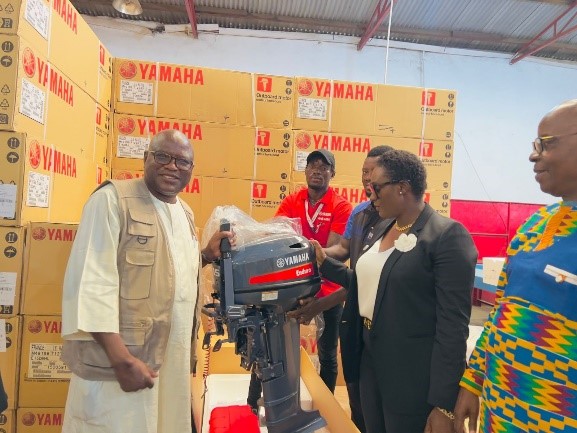The Liberian government, in partnership with the Japanese government and the Food and Agriculture Organization (FAO) of the United Nations, has embarked on an initiative to bolster the Liberian fishing industry and improve the livelihoods of local fishermen. This initiative involves the donation and distribution of essential fishing gear and equipment across the nine coastal counties of Liberia. A recent delivery of supplies, inspected by Director General Emma Metieh Glassco of the National Fisheries and Aquaculture Authority (NaFAA), included a substantial amount of equipment: 100 units each of 15-horsepower Yamaha outboard engines, GPS navigation systems, lifejackets, float boat security lights, horns, and buoys. This donation signifies a significant investment in modernizing the Liberian fishing sector and enhancing the safety and productivity of local fishermen.
This recent contribution builds upon previous support from the Japanese government. In 2019, a similar donation of Yamaha outboard engines was distributed to fishing cooperatives across Liberia. This ongoing partnership underscores a commitment to sustainable development within the Liberian fishing industry and recognizes the vital role this sector plays in the country’s economic growth and food security. The provision of modern equipment not only increases fishing yields but also equips fishermen with the tools necessary to operate more safely and efficiently.
Beyond the direct provision of equipment, NaFAA is also working to establish long-term solutions for accessible and affordable fishing gear. Director General Glassco expressed NaFAA’s commitment to collaborating with other government agencies and CFAO Mobility, the authorized agent for distributing the equipment, to develop a Memorandum of Understanding (MoU). This agreement aims to facilitate the local supply of fishing gear at reduced costs, addressing the current challenge faced by Liberian fishermen who often resort to purchasing equipment from neighboring countries at inflated prices. This MoU would involve tax reductions for CFAO Mobility, incentivizing their continued involvement in supplying essential fishing equipment within Liberia.
This commitment to local sourcing of equipment aligns with NaFAA’s broader strategy to strengthen the Liberian fishing industry and reduce dependence on external suppliers. By fostering local procurement, NaFAA can contribute to the growth of domestic businesses, create employment opportunities, and ensure that Liberian fishermen have consistent access to affordable and essential equipment. This initiative ultimately empowers local communities and promotes self-sufficiency within the fishing sector.
CFAO Mobility has expressed enthusiasm for collaboration and shared their experience in producing and selling fiberglass boats in Senegal. This presents a potential avenue for expanding the scope of locally available fishing equipment in Liberia and further modernizing the industry. The introduction of fiberglass boats could significantly improve the durability and efficiency of fishing operations, contributing to increased catches and enhanced safety for fishermen. This potential partnership underscores the importance of collaborative efforts in developing sustainable solutions for the Liberian fishing sector.
The FAO’s involvement in this initiative highlights the international community’s recognition of the importance of supporting sustainable fishing practices in developing countries. Dr. Ahmed Ibrahim Gashash, the Officer-in-Charge of the FAO Representation in Liberia, emphasized the transformative potential of the donated equipment. He noted that these resources will enable small-scale fishermen to transition from traditional, less efficient methods, such as using paddle-powered dugout canoes, to motorized vessels equipped with modern technology. This shift will not only increase fishing yields but also enhance safety measures with the inclusion of lifejackets, buoys, GPS navigation systems, security lights, and horns. Furthermore, the equipment is specifically intended to support the anticipated fifteen fish processing facilities planned for the nine coastal counties, strengthening the entire value chain from catch to processing and distribution.














